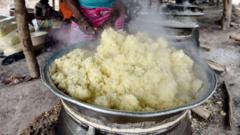Ivory Coast's national dish, attiéké, has been awarded UN cultural heritage status alongside renowned global delicacies like Japanese sake and Caribbean cassava bread. This recognition raises questions about the dish's profound popularity and enduring charm. BBC Africa correspondent Mayeni Jones, who grew up in Ivory Coast and is a devoted enthusiast of attiéké, reflects on its significance.
As a child, I recall the sweet serenade of vendors shouting "Attiéké chaud! Attiéké chaud!" while parading their steaming baskets of the beloved dish throughout my neighborhood. Now, 25 years later, vendors still ply their trade in the bustling streets of Abidjan, the nation's capital, all while attiéké has constituted itself as a staple at nearly every restaurant and hospitality venue, from humble eateries to luxurious establishments.
The demand for attiéké has spread beyond Ivory Coast, firmly nestling itself in the culinary landscapes of French-speaking African nations, as well as neighboring countries like Ghana and Sierra Leone, where local variations often emerge.
This distinctive cassava dish captures palates with its tangy flavor profile, resulting from a meticulous preparation process in which cassava tubers are grated, fermented, dried, and steamed. Renowned Ivorians chefs offer nuanced descriptions of attiéké, likening its texture to couscous — "fluffy yet granular," acclaims chef Rōze Traore, while Paule-Odile Béké emphasizes its "sour, zingy and sweet" appeal.
Notably gluten-free, attiéké comes in various grain sizes; the finest varieties command premium prices, while regional differences yield colorful adaptations such as the red attiéké soaked in palm oil.
Culinary traditions hold attiéké in high esteem, as patrons often indulge in it alongside grilled chicken or fish paired with a spicy tomato sauce and fresh salsa. It was one of the first recipes I prepared for my husband, who was so enamored that he proposed establishing a restaurant centered around the dish. Despite its humble origins, attiéké has become a daily indulgence, frequently shared during festive gatherings and essential moments of connection.
Béké, an accomplished chef with familial ties to attiéké making, emphasizes the regional nuances that lend the dish variety: "Our attiéké will be a bit more yellow than some other regions due to the proximity of the sea." She skillfully incorporates attiéké into her modern menus in New York, highlighting its cultural importance.
The bittersweet memories tied to attiéké also resonate with me. At 14, I fled Ivory Coast amid civil turmoil but found comfort in the dishes that evoke my childhood. Even in England, I sought out attiéké from Congolese markets, and more recently, in South Africa, it has been a priority to discover suppliers.
The spirit of attiéké encompasses more than mere flavors; it embodies togetherness. Chef Charlie Koffi describes it as a dish that fosters camaraderie, much like injera from Ethiopia or thieboudienne from Senegal. In gatherings, friends and families share large portions of attiéké, reaffirming bonds over meals enjoyed in one another's company.
The political turbulence of my childhood may have distanced me from home, but attiéké remained a savory bridge that connected me to my roots. The local dialect, Nouchi, which colored my upbringing, speaks to the experiences that unite the Ivorian diaspora, and sharing attiéké with other expatriates brings back a sliver of home.
As I navigated my adult life and returned to Ivory Coast to work for an NGO, I immersed myself in the richness of local culinary history. An Ivorian colleague shared how attiéké traditionally accompanied kedjenou — a rich, smoky stew fragrant with tomatoes and spices. While French influence shifted its modern pairing to grilled proteins, attiéké's heritage lives on through its endless adaptability.
With its inclusion on the UNESCO list for urgent safeguarding, attiéké now stands poised to capture the attention and appreciation it truly deserves, transcending boundaries and uniting people through the simple act of sharing a meal.



















